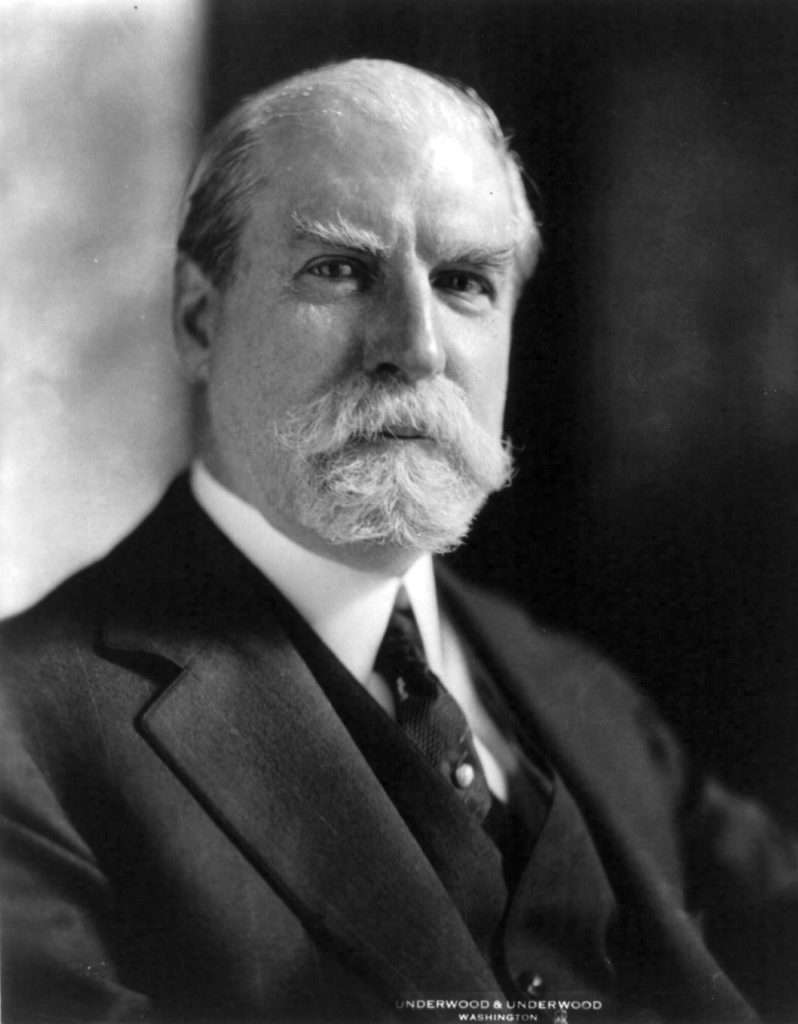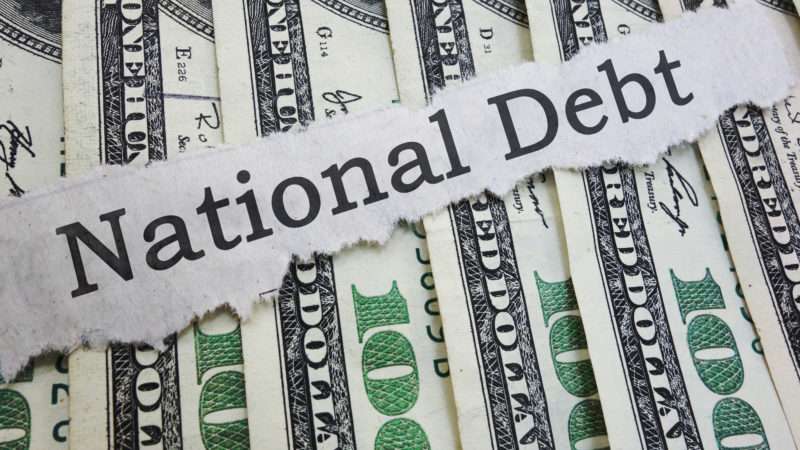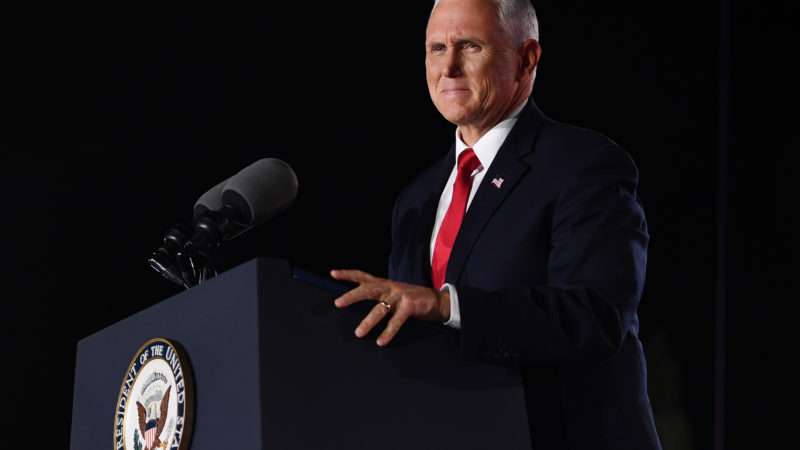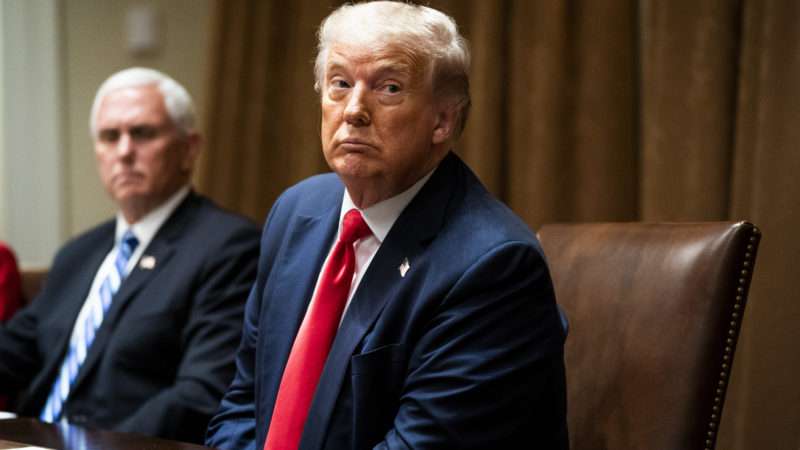8/27/1948: Chief Justice Charles Evans Hughes dies.

from Latest – Reason.com https://ift.tt/32u78uX
via IFTTT
another site
8/27/1948: Chief Justice Charles Evans Hughes dies.

from Latest – Reason.com https://ift.tt/32u78uX
via IFTTT

Sacramento County, California, Public Health, has closed Capital Christian School, claiming that teaching is going on there. Under a state mandate, schools in counties with high levels of coronavirus cases, such as Sacramento County, cannot hold in-person high school classes. However, daycares are still allowed to operate. Capital Christian recently reopened its high school as daycare. Head of School Tim Wong denies it is providing on-site instruction but says that by being in daycare the high school students can get a level of support they can’t get at home while they individually work on their online assignments. The school faces fines of up to $1,000 a day if it remains open to high school students.
from Latest – Reason.com https://ift.tt/2EB23bY
via IFTTT

Sacramento County, California, Public Health, has closed Capital Christian School, claiming that teaching is going on there. Under a state mandate, schools in counties with high levels of coronavirus cases, such as Sacramento County, cannot hold in-person high school classes. However, daycares are still allowed to operate. Capital Christian recently reopened its high school as daycare. Head of School Tim Wong denies it is providing on-site instruction but says that by being in daycare the high school students can get a level of support they can’t get at home while they individually work on their online assignments. The school faces fines of up to $1,000 a day if it remains open to high school students.
from Latest – Reason.com https://ift.tt/2EB23bY
via IFTTT

Intellectuals are supposed to speak truth to power. Unfortunately, some seem to be more interested in saying what everyone expects them to say, which only reinforces the status quo. Thankfully, a few scholars are resisting this trend, fighting for what is true rather than what is popular.
Case in point: a recent Hoover Institution paper by economists John Cogan, Daniel Heil and John Taylor, which makes the case for a reduction in spending now in order to positively impact the economy.
It’s refreshing to see their research, considering that we live in a world where pundits and even economists bend over backward to make the case that more debt is not a problem and that more fiscal stimulus is desirable. Never mind that the arguments that intellectuals offer to defend these claims aren’t supported by the academic literature. Consider the mistaken notion that more spending will stimulate the economy and somehow reduce the debt burden of the policy in the first place. Research overwhelmingly confirms that, for a variety of reasons, the return of government spending on economic growth is much less than the money spent.
Then there’s the argument that interest rates are low and hence, it’s a good time to take on more debt—despite the chance that variable interest won’t always be that low. But more debt, even at low rates, still means more interest payments. Before COVID-19, the United States paid close to $400 billion in interest payments annually, or 8 percent of our budget. It’s only going to get worse now. Japan, for instance, has a massive amount of debt, despite its 0 percent long-term interest rates. Its debt repayments are its second-largest budget item.
I wish reporters and economists would stop asserting, like the Wall Street Journal recently did, “the example of Japan has shown that debts can rise for a long time, well above 200 percent of GDP, without sparking a fiscal crisis.” Really? I would have thought that Japan’s two decades of no growth and wage stagnation could be considered a crisis.
Moreover, Japan is quite different than the United States and can get away with more overall debt than we could. That’s because most Japanese securities are held in the Social Security trust fund that’s owned by the government. This means that net public sector debt is actually significantly lower in Japan than in the United States.
Enter the new paper by Cogan, Heil and Taylor, which finds that, when faced with an inevitable debt explosion in our future, the only viable and desirable option is for Uncle Sam to limit expenditures as a share of GDP, around the 20 percent ratio that prevailed before the pandemic. The authors find that this approach avoids the “potentially large increase in future federal taxes.” Better yet, they actually find that the policy would boost both short- and long-term GDP.
This research will be added to decades of empirical evidence that spending-based consolidations are expansionary in the long term and, sometimes, can boost growth in the short term, too. However, my excitement with the paper is actually rooted in their scholarship and methodology, not just their conclusions.
Here’s why: The traditional objection against spending cuts is that they hurt demand (consumption), but this study shows that a reduction in spending actually increases consumption in the short run and into the long run. That’s because, in the same way people tend to increase their savings during a recession due to fear of the future, consumers also consider the long-term tax implications of today’s spending measures. They’ll increase their spending and investment habits in anticipation of future tax cuts—or, at the very least, no future tax hikes. The result is that the growth in output resulting from the spending restraint is driven primarily by consumption, which should be politically salient. The authors, however, also highlight that, as expected, investment reacts positively in the long run.
At a time when flawed arguments for more government spending and more debt are reemerging, this paper goes against the big government status quo and offers a blueprint for us to not only regain control of our spiraling debt but also do so in a way that will boost short- and long-term economic growth by boosting demand and then investment.
from Latest – Reason.com https://ift.tt/2QrxuI6
via IFTTT

Intellectuals are supposed to speak truth to power. Unfortunately, some seem to be more interested in saying what everyone expects them to say, which only reinforces the status quo. Thankfully, a few scholars are resisting this trend, fighting for what is true rather than what is popular.
Case in point: a recent Hoover Institution paper by economists John Cogan, Daniel Heil and John Taylor, which makes the case for a reduction in spending now in order to positively impact the economy.
It’s refreshing to see their research, considering that we live in a world where pundits and even economists bend over backward to make the case that more debt is not a problem and that more fiscal stimulus is desirable. Never mind that the arguments that intellectuals offer to defend these claims aren’t supported by the academic literature. Consider the mistaken notion that more spending will stimulate the economy and somehow reduce the debt burden of the policy in the first place. Research overwhelmingly confirms that, for a variety of reasons, the return of government spending on economic growth is much less than the money spent.
Then there’s the argument that interest rates are low and hence, it’s a good time to take on more debt—despite the chance that variable interest won’t always be that low. But more debt, even at low rates, still means more interest payments. Before COVID-19, the United States paid close to $400 billion in interest payments annually, or 8 percent of our budget. It’s only going to get worse now. Japan, for instance, has a massive amount of debt, despite its 0 percent long-term interest rates. Its debt repayments are its second-largest budget item.
I wish reporters and economists would stop asserting, like the Wall Street Journal recently did, “the example of Japan has shown that debts can rise for a long time, well above 200 percent of GDP, without sparking a fiscal crisis.” Really? I would have thought that Japan’s two decades of no growth and wage stagnation could be considered a crisis.
Moreover, Japan is quite different than the United States and can get away with more overall debt than we could. That’s because most Japanese securities are held in the Social Security trust fund that’s owned by the government. This means that net public sector debt is actually significantly lower in Japan than in the United States.
Enter the new paper by Cogan, Heil and Taylor, which finds that, when faced with an inevitable debt explosion in our future, the only viable and desirable option is for Uncle Sam to limit expenditures as a share of GDP, around the 20 percent ratio that prevailed before the pandemic. The authors find that this approach avoids the “potentially large increase in future federal taxes.” Better yet, they actually find that the policy would boost both short- and long-term GDP.
This research will be added to decades of empirical evidence that spending-based consolidations are expansionary in the long term and, sometimes, can boost growth in the short term, too. However, my excitement with the paper is actually rooted in their scholarship and methodology, not just their conclusions.
Here’s why: The traditional objection against spending cuts is that they hurt demand (consumption), but this study shows that a reduction in spending actually increases consumption in the short run and into the long run. That’s because, in the same way people tend to increase their savings during a recession due to fear of the future, consumers also consider the long-term tax implications of today’s spending measures. They’ll increase their spending and investment habits in anticipation of future tax cuts—or, at the very least, no future tax hikes. The result is that the growth in output resulting from the spending restraint is driven primarily by consumption, which should be politically salient. The authors, however, also highlight that, as expected, investment reacts positively in the long run.
At a time when flawed arguments for more government spending and more debt are reemerging, this paper goes against the big government status quo and offers a blueprint for us to not only regain control of our spiraling debt but also do so in a way that will boost short- and long-term economic growth by boosting demand and then investment.
from Latest – Reason.com https://ift.tt/2QrxuI6
via IFTTT

As he capped off the third night of the Republican National Convention, Vice President Mike Pence may have briefly given voters hope that the trade war with China could soon come to an end.
Discussing China in his convention speech, Pence claimed that Democratic presidential candidate Joe Biden “wants to repeal all the tariffs that are leveling the playing field for American workers.”
Don’t get your hopes up. No matter who wins November’s general election, a wind-down of the import taxes that President Donald Trump imposed on Chinese-made goods is unlikely to be a priority.
Biden has carefully avoided committing to doing much of anything about Trump’s tariffs if he wins. Biden does indeed have a long track record in supporting lower barriers to trade—as a member of the Senate, for example, he supported the North American Free Trade Agreement, which substantially reduced tariffs and boosted American jobs by making trade freer. But as the contemporary Democratic Party steered him leftward, he backed away from that stance on the campaign trail this year.
Most recently, Biden’s campaign walked back some imprecise comments in which the candidate appeared to endorse ending Trump’s tariffs. The Biden campaign has also published a trade policy platform that includes such questionable ideas as a mandatory “Buy American” provision that would increase what the federal government has to pay when it makes purchases. The platform also parrots some of the Trump administration’s misguided talking points about America’s supposed dependence on imported medical goods.
So there’s no sign that Pence’s accusation that Biden would lift Trump’s tariffs on China is true. What’s more worrying, though, is that Pence seems to believe those tariffs are “leveling the playing field for American workers.”
Really? American manufacturing dipped into a recession last year—even before the COVID-19 pandemic struck—and a major culprit was those same tariffs (along with tariffs the Trump administration has imposed on imported steel and aluminum). Tariffs are nothing more than taxes, and the Trump administration’s tariffs have raised taxes on American consumers and businesses by an estimated $57 billion annually.
Trump touted those tariffs as necessary pain for future gain, but the benefits haven’t arrived. The limited trade deal Trump struck with China late last year—a deal that did not result in the lifting of any tariffs—was supposed to boost Chinese purchases of American agricultural goods, manufacturing supplies, and energy. But data tracked by the Peterson Institute for International Economics shows that China is not coming close to meeting those obligations. When asked about it, Trump has mostly shrugged off any concerns.
Trump’s tariffs hiked costs for American businesses and consumers, and the trade war’s benefits appear to be illusory. Biden absolutely should want to scrap Trump’s trade barriers. Unfortunately, Pence is wrong to promise that he will.
from Latest – Reason.com https://ift.tt/3jjwhPw
via IFTTT

As he capped off the third night of the Republican National Convention, Vice President Mike Pence may have briefly given voters hope that the trade war with China could soon come to an end.
Discussing China in his convention speech, Pence claimed that Democratic presidential candidate Joe Biden “wants to repeal all the tariffs that are leveling the playing field for American workers.”
Don’t get your hopes up. No matter who wins November’s general election, a wind-down of the import taxes that President Donald Trump imposed on Chinese-made goods is unlikely to be a priority.
Biden has carefully avoided committing to doing much of anything about Trump’s tariffs if he wins. Biden does indeed have a long track record in supporting lower barriers to trade—as a member of the Senate, for example, he supported the North American Free Trade Agreement, which substantially reduced tariffs and boosted American jobs by making trade freer. But as the contemporary Democratic Party steered him leftward, he backed away from that stance on the campaign trail this year.
Most recently, Biden’s campaign walked back some imprecise comments in which the candidate appeared to endorse ending Trump’s tariffs. The Biden campaign has also published a trade policy platform that includes such questionable ideas as a mandatory “Buy American” provision that would increase what the federal government has to pay when it makes purchases. The platform also parrots some of the Trump administration’s misguided talking points about America’s supposed dependence on imported medical goods.
So there’s no sign that Pence’s accusation that Biden would lift Trump’s tariffs on China is true. What’s more worrying, though, is that Pence seems to believe those tariffs are “leveling the playing field for American workers.”
Really? American manufacturing dipped into a recession last year—even before the COVID-19 pandemic struck—and a major culprit was those same tariffs (along with tariffs the Trump administration has imposed on imported steel and aluminum). Tariffs are nothing more than taxes, and the Trump administration’s tariffs have raised taxes on American consumers and businesses by an estimated $57 billion annually.
Trump touted those tariffs as necessary pain for future gain, but the benefits haven’t arrived. The limited trade deal Trump struck with China late last year—a deal that did not result in the lifting of any tariffs—was supposed to boost Chinese purchases of American agricultural goods, manufacturing supplies, and energy. But data tracked by the Peterson Institute for International Economics shows that China is not coming close to meeting those obligations. When asked about it, Trump has mostly shrugged off any concerns.
Trump’s tariffs hiked costs for American businesses and consumers, and the trade war’s benefits appear to be illusory. Biden absolutely should want to scrap Trump’s trade barriers. Unfortunately, Pence is wrong to promise that he will.
from Latest – Reason.com https://ift.tt/3jjwhPw
via IFTTT
New York Attorney General Letitia James is asking a court to dissolve the National Rifle Association due to alleged financial improprieties by the NRA’s leadership. According to James:
The NRA’s influence has been so powerful that the organization went unchecked for decades while top executives funneled millions into their own pockets. . . . The NRA is fraught with fraud and abuse, which is why, today, we seek to dissolve the NRA, because no organization is above the law.
Such a move would certainly put an end to the alleged fraud and abuse. It would also deprive gun owners of a powerful political ally.
David Cole, national legal director of the American Civil Liberties Union, has taken to the WSJ editorial page to defend the NRA from James’s suit, highlighting the danger of allowing elected officials to target and dissolve political nonprofits they oppose. As Cole notes, “If the New York attorney general can do this to the NRA, why couldn’t the attorney general of a red state take similar action against the ACLU, the AFL-CIO, Common Cause, or Everytown for Gun Safety?”
Cole writes:
Our democracy is premised on the right of association. The First Amendment protects not only the right to speak, but also to band together with others to advance one’s views. Making or resisting change in a democracy requires collective action, and a healthy democracy therefore demands a robust “civil society.” The right to associate can’t survive if officials can shut down organizations with which they disagree. . . .
[W]e believe Ms. James has also gone too far. Dissolution of a nonprofit is the most extreme remedy state regulators can seek. It has historically been reserved for organizations that are essentially false fronts for personal gain. . . .
Dissolution is proper only where a corporation is so subsumed by waste, misuse or fraud that it no longer fulfills a charitable purpose. There is simply no precedent for such extreme action against an organization like the NRA, which, whether you like it or not, has been serving charitable purposes very effectively (indeed, many of its opponents would say, too effectively) for a century and a half. And even if the threat of dissolution is meant only to gain leverage for a deal, threats of unconstitutional action ought not be a part of the attorney general’s arsenal.
Cole is correct. If specific NRA officials have abused their positions they should be removed. If they committed crimes, they should be prosecuted. But the ability of the NRA’s members to associate and pursue their political priorities should not be impaired due to the malfeasance of NRA officials.
from Latest – Reason.com https://ift.tt/3lka7P3
via IFTTT
New York Attorney General Letitia James is asking a court to dissolve the National Rifle Association due to alleged financial improprieties by the NRA’s leadership. According to James:
The NRA’s influence has been so powerful that the organization went unchecked for decades while top executives funneled millions into their own pockets. . . . The NRA is fraught with fraud and abuse, which is why, today, we seek to dissolve the NRA, because no organization is above the law.
Such a move would certainly put an end to the alleged fraud and abuse. It would also deprive gun owners of a powerful political ally.
David Cole, national legal director of the American Civil Liberties Union, has taken to the WSJ editorial page to defend the NRA from James’s suit, highlighting the danger of allowing elected officials to target and dissolve political nonprofits they oppose. As Cole notes, “If the New York attorney general can do this to the NRA, why couldn’t the attorney general of a red state take similar action against the ACLU, the AFL-CIO, Common Cause, or Everytown for Gun Safety?”
Cole writes:
Our democracy is premised on the right of association. The First Amendment protects not only the right to speak, but also to band together with others to advance one’s views. Making or resisting change in a democracy requires collective action, and a healthy democracy therefore demands a robust “civil society.” The right to associate can’t survive if officials can shut down organizations with which they disagree. . . .
[W]e believe Ms. James has also gone too far. Dissolution of a nonprofit is the most extreme remedy state regulators can seek. It has historically been reserved for organizations that are essentially false fronts for personal gain. . . .
Dissolution is proper only where a corporation is so subsumed by waste, misuse or fraud that it no longer fulfills a charitable purpose. There is simply no precedent for such extreme action against an organization like the NRA, which, whether you like it or not, has been serving charitable purposes very effectively (indeed, many of its opponents would say, too effectively) for a century and a half. And even if the threat of dissolution is meant only to gain leverage for a deal, threats of unconstitutional action ought not be a part of the attorney general’s arsenal.
Cole is correct. If specific NRA officials have abused their positions they should be removed. If they committed crimes, they should be prosecuted. But the ability of the NRA’s members to associate and pursue their political priorities should not be impaired due to the malfeasance of NRA officials.
from Latest – Reason.com https://ift.tt/3lka7P3
via IFTTT

President Donald Trump has said that he is sending federal law enforcement to Kenosha, Wisconsin in order to police the rioting that has broken out in the city following the shooting of Jacob Blake by Kenosha police on Sunday.
“We will NOT stand for looting, arson, violence, and lawlessness on American streets,” said Trump on Twitter Wednesday afternoon. “I will be sending federal law enforcement and the National Guard to Kenosha, WI to restore LAW and ORDER!”
We will NOT stand for looting, arson, violence, and lawlessness on American streets. My team just got off the phone with Governor Evers who agreed to accept federal assistance (Portland should do the same!)…
— Donald J. Trump (@realDonaldTrump) August 26, 2020
Trump says that Wisconsin Gov. Tony Evers, a Democrat, accepted the offer of federal assistance today, an offer he declined yesterday.
The governor had already authorized the deployment of 250 Wisconsin National Guard troops to Kenosha County following the rioting that broke out there on Sunday night. Today, he increased that number to 500.
Evers has also declared a state of emergency and an 8 p.m. curfew has been imposed in Kenosha. The New York Times reports that roughly 100 National Guard troops had been deployed to the city already.
The White House is authorizing the deployment of 2,000 National Guard troops from neighboring states in addition to 200 federal law enforcement personnel to assist state and local police, the Milwaukie Sentinel Journal reports.
Violence escalated in Kenosha last night when two people at demonstrations were fatally shot, and a third wounded. A 17-year-old Illinois teen, reportedly one of the vigilantes that have posted up outside of businesses in the city with the stated aim of preventing property destruction, has been arrested and charged with first-degree intentional homicide.
It’s not clear how many of the National Guard troops or federal agents will end up being deployed to Kenosha, or if any have arrived already. Reason‘s request for comment to Evers and Department of Homeland Security have not been returned.
The Sentinal-Journal reports that the decision to deploy additional National Guard troops is at the discretion of Wisconsin National Guard Adjutant General Paul Knapp.
“President Trump’s threat today to send federal law enforcement to Kenosha is misguided and will only make matters worse. We don’t need more police, we need to end police violence,” said Chris Ott, executive director of the ACLU of Wisconsin, in a statement this afternoon.
from Latest – Reason.com https://ift.tt/2D0Li9u
via IFTTT